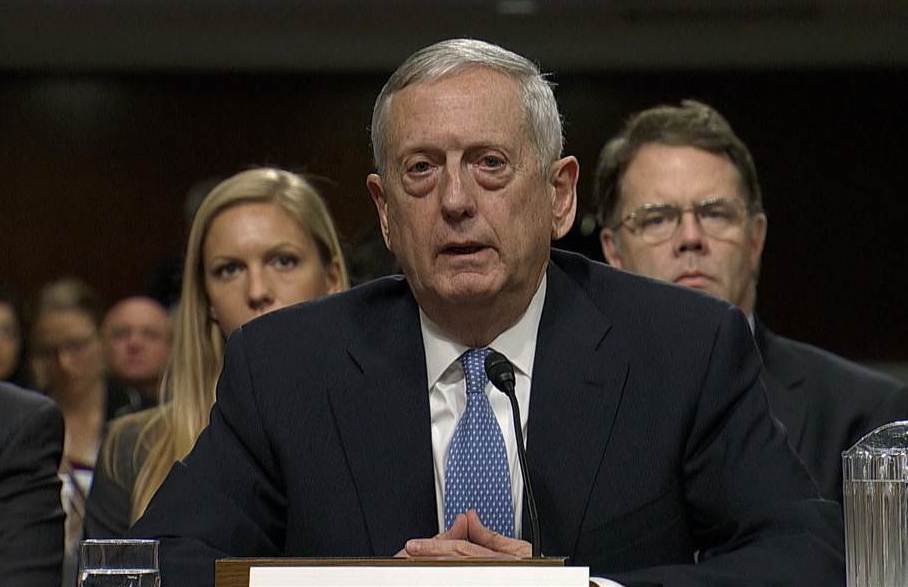
Seapower leaders on the House Armed Services Committee pressed Pentagon leaders Monday night to explain why the president’s 2018 budget request does not put the Navy on a path to have a fleet of 355 ships.
Rep. Joe Courtney, (D-Conn.), led the way asking why the $603 billion request didn’t call for 12 ships, rather than nine as part of the Fiscal Year 2018 budget. “We’re living off a legacy fleet” and said that if that level continued the fleet would top out at 308 ships rather than 355.
Defense Secretary James Mattis, testifying at the rare evening hearing, said, “we’ve got to weave” all the services’ requests into one piece in the request and not just shipbuilding. He cited Army manpower shortages, Air Force fighter and naval aviation needs as requiring attention as well.
“As you know ships are expensive” and require long times to build, he said.
Rep. Rob Wittman, (R-Va.) and chairman of the seapower panel, asked in a follow-up question why $1 billion had been cut from the expected shipbuilding request. “We’ve been marking time,” while potential adversaries such as Russia and China modernize their armed forces.
“We need to catch up,” he said.
Mattis said, “I share your sense of urgency [but] we’re not going to get out of this [readiness and modernization challenge] in one year.” As he answered to a series of questions from other members over readiness and modernization shortfalls, Mattis said sustained growth in the defense budget of 5 percent per year, especially between fiscal years 2019 and 2021 was critical to meet new challenges and requirements.
Marine Gen. Joseph Dunford, chairman of the Joint Chiefs, added, “We’re confronted with what’s called a bow wave” of needed modernization from nuclear forces to cyber to ships to aircraft to vehicles. But as he noted in several different ways, “procurement is readiness,” and this budget request and the one for FY 2017 started to get at readiness shortfalls in flight hours, ship building and repair and training ground forces.
Later in answer to another question about the size of the future fleet, Mattis said, ”We’ve got to get the fleet we have now back to sea,” which means addressing immediate readiness.
Likewise, he said buying F/A-18E/F Super Hornets was a short-term fix for naval aviation until more F-35s join the air wings. Repairing older F/A-18s were costly and did not provide the needed bridge to the future.
The overriding concern expressed by committee members and Dunford and Mattis was to really move ahead with Pentagon modernization across-the-board was to repeal the Budget Control Act with its spending caps. The current request for the Defense Department is more than $50 billion above the caps.
Members and the panelists also agreed Congress’ inability to pass regular budgets, instead relying on Continuing Resolutions with strict limitations on how much and where money can be spent to keep the government’s doors open complicates modernizing existing systems and buying new ones.
“We’re not able to give industry [a clear idea] of the right magnitude of resources” they need to have to proceed with long-term programs under continuing resolutions, Dunford said. For defense industry, Dunford said this translates into there is no predictability of what the federal government will be spending in future years. Mattis added it also throws a blanket over possible savings that could be seen by entering multi-year contracts with civilian industry when the government is limited by what it can do under the resolution.
On North Korea’s nuclear and missiles programs, Mattis said existing anti-ballistic missile sites in Alaska and California are capable of meeting the threat now. As for Pyongyang’s pressing forward on intercontinental ballistic missiles capable of carrying nuclear weapons striking the United States, “we don’t have to wait” until they are fielded to respond.
If it were a conventional war on the Korean Peninsula, Mattis said, “It would be a war like nothing we’ve seen since 1953.” Dunofrd said, “I don’t have any doubt [that} we will win,” but casualties in the first few days especially in and around Seoul would be very high.
In opening the hearing, Chairman Mac Thornberry, (R-Texas), said, “2018 is a big decision point” for Congress and the Pentagon. Ranking Member Adam Smith, (D-Wash.) seconded that, adding Capitol Hill for too long “has been putting off choices of what we want to do” with the money that is available.





